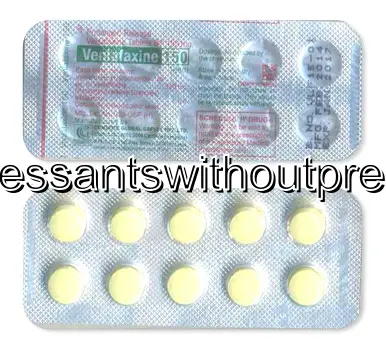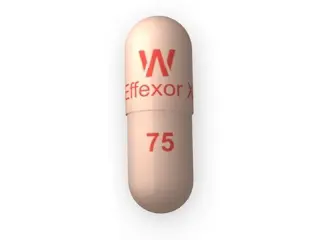| Package | Dosage | Price | Price per Dose | |
|---|---|---|---|---|
| Dosage: 37,5mg | ||||
| 360 pill | 37,5mg | £345.57 | £0.96 | |
| 240 pill | 37,5mg | £253.26 | £1.05 | |
| 180 pill | 37,5mg | £202.37 | £1.12 | |
| 120 pill | 37,5mg | £142.01 | £1.18 | |
| 90 pill | 37,5mg | £119.52 | £1.33 | |
| 60 pill | 37,5mg | £93.49 | £1.56 | |
| 30 pill | 37,5mg | £53.25 | £1.78 | |
| Dosage: 75mg | ||||
| 360 pill | 75mg | £527.83 | £1.47 | |
| 240 pill | 75mg | £363.32 | £1.51 | |
| 180 pill | 75mg | £287.58 | £1.60 | |
| 120 pill | 75mg | £214.20 | £1.79 | |
| 90 pill | 75mg | £171.60 | £1.91 | |
| 60 pill | 75mg | £124.26 | £2.07 | |
| 30 pill | 75mg | £71.00 | £2.37 | |
| 10 pill | 75mg | £28.39 | £2.84 | |

Venlafaxine Description
Understanding Venlafaxine
Venlafaxine is a medication primarily used to treat depression, anxiety, and certain other mental health conditions. It belongs to a class of drugs known as serotonin-norepinephrine reuptake inhibitors (SNRIs). By balancing the levels of key neurotransmitters in the brain, venlafaxine can help improve mood and reduce feelings of anxiety. It is prescribed by healthcare professionals as part of a comprehensive treatment plan, often combined with therapy and lifestyle changes.
How Does Venlafaxine Work?
This medication works by increasing the availability of serotonin and norepinephrine in the brain. These chemicals are responsible for regulating mood, emotional responses, and stress. When these neurotransmitters are imbalanced, it can lead to depressive symptoms or anxiety disorders. Venlafaxine helps to restore this balance, leading to mood improvement and symptom relief over time. Patients usually start noticing benefits within a few weeks of consistent use, though full effects may take longer.
Effectiveness and Benefits
Many users report significant improvement in their emotional well-being when taking venlafaxine. It is especially effective for moderate to severe depression and generalized anxiety disorder. Besides alleviating symptoms of depression, venlafaxine can also help with panic attacks and social anxiety in some cases. Consistency is key; regular use under medical supervision can lead to sustained relief. The medication's dual action on serotonin and norepinephrine often results in a quick onset of antidepressant effects compared to older antidepressants.
Possible Side Effects
Like all medications, venlafaxine can cause side effects. Common ones include nausea, dizziness, dry mouth, sweating, and mild gastrointestinal discomfort. Some users may experience heightened blood pressure or changes in appetite. In rare cases, more serious side effects such as increased risk of suicidal thoughts, especially in young adults, or serotonin syndrome may occur. It is important to monitor for adverse reactions and communicate with a healthcare provider if any unusual symptoms develop.
Precautions and Considerations
Before starting venlafaxine, patients should disclose their complete medical history, including any cardiovascular issues, glaucoma, or history of bleeding problems. It is crucial not to stop the medication suddenly, as this can cause withdrawal symptoms such as irritability, dizziness, or flu-like feelings. The medication may also interact with other drugs, including other antidepressants, blood thinners, or certain pain medications. Regular medical follow-up is necessary to adjust doses and ensure safety.
Usage and Dosage
Venlafaxine is usually taken orally in the form of capsules or tablets. The prescribed dosage varies depending on the severity of the condition and individual response. It is often started at a low dose and gradually increased. Patients should follow their healthcare provider’s instructions carefully and not alter the dose without advice. Consistent daily intake is essential for optimal results. It may take several weeks before the full benefits are experienced.
Longevity of Treatment
Many individuals need to take venlafaxine for several months or even longer periods to maintain the benefits. Stopping the medication abruptly is not recommended; instead, a healthcare provider will usually suggest a gradual reduction to prevent withdrawal symptoms. Continuous evaluation helps determine whether ongoing therapy is necessary or if adjustments are needed based on the patient’s progress.
Summary
Venlafaxine can be a highly effective treatment for depression and anxiety when used appropriately. Its ability to target multiple neurotransmitters accounts for its therapeutic benefits. However, it requires careful management due to possible side effects and drug interactions. Patients are advised to work closely with their healthcare provider to monitor progress and ensure safe and effective use of this medication. Proper adherence and communication are essential components of successful treatment with venlafaxine.


